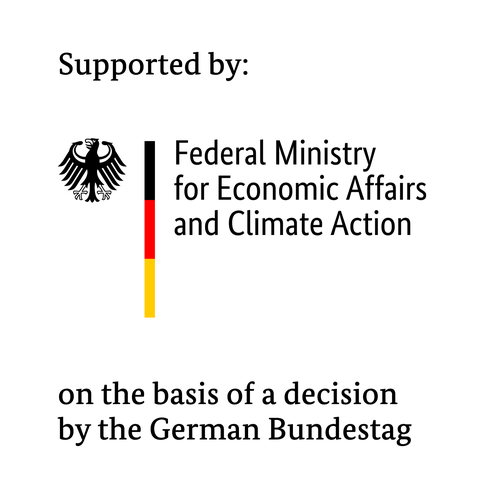DARING - Digitalized heat storage for the energy transition
Duration: 01 August 2023 - 30 April 2027
Funding amount: €910,627.47
Funded by: BMWK
Summary:
The DARING project focuses on optimizing the energy efficiency of thermal storage systems in building energy supply through advanced load management and innovative sensor technologies. A key element in this effort is the development of a highly precise sensor skin based on printable organic thin-film electronics. This technology, built on research from the Institute for Applied Physics (IAPP) at TU Dresden, enables real-time monitoring of temperature and other relevant parameters across large areas. This creates the foundation for a significant increase in efficiency in heat pump systems and solar thermal systems, with projected energy savings of up to 10%.
DARING aims to raise the technology readiness level (TRL) of the sensor skin from the current level of 4 to 7 to ensure practical application. The core technology is based on printable organic electronics, which, through liquid processing, allows for nearly unlimited shape and function while requiring minimal material and energy resources. This approach not only provides significant cost advantages but also offers a superior CO₂ footprint compared to conventional sensor solutions.
The project is conducted by an interdisciplinary consortium, where fundamental physics research and applied technology development go hand in hand. In addition to the IAPP at TU Dresden and the Chair of Building Energy Systems and Heat Supply (GEWV), leading industry partners such as Viessmann Climate Solutions SE and Cupasol GmbH are involved. This collaboration ensures that theoretical concepts are translated into practical solutions.
DARING is divided into two phases: The first phase focuses on the physical optimization of the sensor skin for use in thermal storage systems, including defining and implementing target parameters such as accuracy, response time, and long-term stability. In this phase, deep physical expertise is applied to enable precise control of complex thermodynamic systems. The second phase involves testing the technology in real-world applications at Viessmann and other partners to validate its efficiency and retrofitting capabilities.
By strategically networking heating systems and integrating renewable energy sources, DARING contributes not only to the reduction of primary energy demand but also to advancing the digitalization of the heating sector. Physically grounded innovations like the sensor skin could play a key role in realizing the energy transition in heating systems, thereby significantly supporting the climate policy goals of the German government.
Project partners:
GEWV, TU Dresden, Germany
Contact:
 © Kai Schmidt /IAP
© Kai Schmidt /IAP
Prof. Dr. Karl Leo
Chair of Optoelectronics
Send encrypted email via the SecureMail portal (for TUD external users only).

